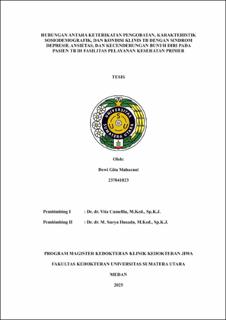| dc.description.abstract | Background: Tuberculosis (TB) remains a leading cause of global morbidity and
mortality, with Indonesia ranking as the country with the second highest TB
burden in the world. Treatment success is highly influenced by patient adherence,
which is often disrupted by depression, anxiety, and social stigma. These
psychological disorders increase the risk of suicide among TB patients,
particularly those with chronic illnesses. Primary healthcare facilities, especially
community health centers, play a strategic role in TB control through integrated
service networks aimed at improving early diagnosis, treatment adherence, and
reducing the psychological impact on patients.
Methods: This study employed a cross-sectional design involving 79 TB patients
selected through consecutive sampling. Instruments used included the Hospital
Anxiety and Depression Scale (HADS) to assess depressive and anxiety
syndromes, the Beck Scale for Suicide Ideation (BSS) to assess suicidal
tendencies, and the Medication Adherence Rating Scale (MARS-10) to assess
treatment adherence. Data were analyzed using chi-square tests and multivariate
logistic regression with a significance level of p<0.05.
Results: Significant associations were found between gender and depressive
syndrome in TB patients (p=0.036), educational level and anxiety syndrome
(p=0.045), treatment adherence and suicidal tendency (p=0.021), and gender and
suicidal tendency (p=0.055).
Conclusion: This study revealed significant associations between gender and
depressive syndrome, educational level and anxiety syndrome, as well as
treatment adherence and suicidal tendency among TB patients. Additionally,
gender was found to influence suicidal tendencies. These findings highlight the
importance of a more comprehensive approach that considers sociodemographic
factors and treatment adherence in efforts to improve the mental health of TB
patients.
Keywords: Tuberculosis, depressive syndrome, anxiety, suicide, treatment
adherence. | en_US |


